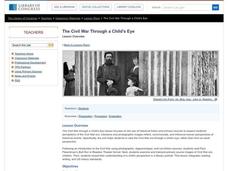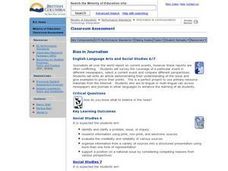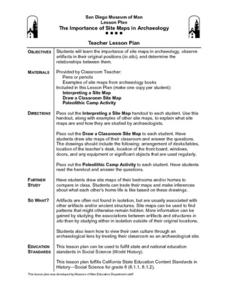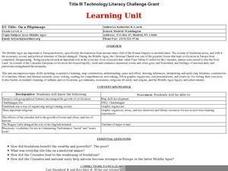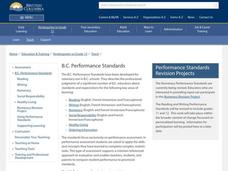Curated OER
Where Did My Lunch Come From? A U.S. Regional Tour
Students explore the five regions of the United States. In this social studies instructional activity, students discuss the regions and the states located in that region. Students discuss the types of food produced in each region and...
Curated OER
The Civil War Through a Child's Eye
Students use primary and secondary sources to observe a child's view of the Civil war. For this Civil War lesson, students understand that different people had different perspectives on the war. Students recognize the...
Curated OER
Cells in the Making
Students examine and research the parts of a cell, their functions, and life processes. They simulate how cells receive nutrients using coffee filters, water, and coffee, and construct cells using pudding, cookie dough, and candy.
Curated OER
The Making of an Organ
Students examine and research how cells make up our organs. They create a model of a tongue showing cells, tissues and the organ.
Curated OER
I Need Air
Pupils examine and research the organs of the respiratory system. They participate in a vocabulary card matching game, create a graphic organizer, and participate in an experiment titled, Floating on Air.
Curated OER
The Seasons of the Year
Students learn about the four seasons. They collaborate in pairs, publish a book, and share with the class. They also brainstorm and collaborate with each other providing literacy skills through listening, speaking and writing activities.
Curated OER
Bias in Journalism
Students evaluate the credibility and reliability of various sources. Students survey the coverage of a particular event in different newspapers, select a current event and compare different perspectives. They write an article...
Curated OER
Digging It - A Garden That Is
Students plan, design, and create a school/community garden. For this planning, designing, and creating a school/community garden lesson, students research materials needed to start a garden. Students determine the cost of...
Curated OER
Islamic Art
Pupils examine the various forms of Islamic Art. Using the art, they identify the basic elements and research its history and style of calligraphy. They create a piece of art based on information they collected and demonstrate...
Curated OER
Learning From Leaves: Adaptations To Differing Light Levels
Students, in groups, examine plants with different light levels. They are given plants from a tropical and desert region. They write a hypothesis at the beginning of the experiment.
Curated OER
The Importance of Site Maps in Archaeology
Students consider the importance of site maps in archeology. They interpret site maps, draw site maps of their classroom and home and then participate in simulated Paleolithic archeological camp activity.
Curated OER
On a Pilgrimage
Sixth graders engage in a variety of learning experiences surrounding the study of the Middle Ages. They construct a map of Europe, create a graphic organizer for the hierarchy of feudalism, design their own family crest, and write their...
Curated OER
Biographical Scene Investigators
Sixth graders become members of the BSI in this research simulation. They apply for Biographical Scene Investigator membership, investigate an individual, keep an evidence notebook and write an investigator's report.
Curated OER
Our Favorites
Pupils participate in and conduct a survey to determine various class favorites. They collect, organize and display their data, interpret the results, and complete a packet of worksheets to display the information.
Curated OER
The Law of Inertia
Learners practice the 4 question strategy to form more questions and develop further experiments. The four questions are engage, explore, explain, and elaborate. They use the 4 question strategy on an investigation involving the mass...
Curated OER
Documenting Where We Are
Students contribute to discussions and identify how an artist elicits a viewer's response. They use William Henry Jackson's Pawnee Indian Village, photograph and painting. After analyzing this information, students use information gained...
Curated OER
Childhood Obesity
Students identify a question to generate appropriate data and predict results. They distinguish between a total population and a sample and use a variety of methods to collect and record data. Students create classifications and ranges...
Curated OER
As Seen on TV
Sixth graders research how minority groups are represented in media. In this media literacy lesson, 6th graders investigate two YouTube clips of Hugo Chavez and discuss different points of view.
Alabama Learning Exchange
As Large As Life. . . A Poster of a Human Body System
Learners explore the major systems and functions of the human body. In this anatomy lesson, students make life-size outlines of bodies, diagram body systems, and present their work to their classmates.
Curated OER
Introduction to Native Americans Thematic Unit
Students consider different cultural viewpoints. For this Native American history lesson, students examine artifacts and then conduct research on selected Native American tribes.
Curated OER
Permafrost
Students use a thermometer to analyze soil temperature data to determine which soil sample is normal, and which one is permafrost. For this permafrost lesson plan, students participate in a hands on activity where they identify the...
Curated OER
Anti-Vietnam War Movement Lesson
Students examine reasons why many Americans opposed the Vietnam War. In this world history lesson, students view a Powerpoint of anti-war images and a timeline of events that led to the war. Students examine speeches made by John Kerry...
Curated OER
Piecing Together the Story of Glenn Cunningham: A Kansas Champion
Learners use primary and secondary sources to conduct research about Glenn Cunningham. In this Glenn Cunningham lesson plan, students tell why he was a hero, and tell facts from what they learned.
Curated OER
Deforestation
Students identify the different tropical rainforests in the world using a map. In this ecology lesson, students describe the different methods of deforestation. They create a memo and present it to class.
Other popular searches
- Making Inferences in Reading
- Making Inferences Reading
- Inferences in Reading
- Reading Inferences 4th Grade
- Reading Inferences 6th Grade
- Reading Inferences Poetry
- 1st Grade Reading Inferences
- Draw Inferences in Reading
- Reading Inferences Handouts
- Guided Reading Inferences
- Shared Reading Inferences
- Make Inferences Reading

